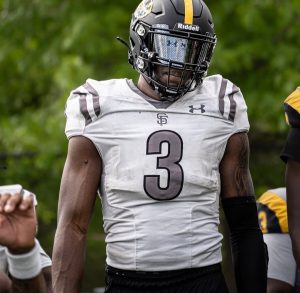
Put an end to throwing him beneath the bus. On Cooper Flagg, ESPN analyst Jay Williams
Cooper Flagg, a rising star in the basketball world, has become a household name in sports circles. At just 16 years old, he is already being compared to the best players in the world, with scouts and fans alike eagerly awaiting his transition to the NBA. His defensive prowess, versatility, and competitive edge make him an exciting prospect, one of the most talked-about high school players in recent memory. But not everyone has been entirely positive about Flagg’s potential. One of the most notable critiques came from ESPN analyst Jay Williams, who made headlines when his comments about Flagg sparked a wave of backlash.
In this article, we’ll break down the controversy surrounding Williams’ remarks, analyze the criticism, and argue that throwing Flagg “under the bus” is neither fair nor helpful. Instead, we’ll advocate for a more constructive, supportive approach when discussing the development of young athletes like Flagg.
Cooper Flagg – A Rising Star in Basketball
Before delving into the criticism, it’s essential to understand who Cooper Flagg is and why he has generated so much excitement. Cooper Flagg, hailing from Maine, has been on basketball radars since his middle school years. By the time he reached high school, his skillset and performances were already garnering attention from some of the top basketball programs in the country. What stands out about Flagg is his rare combination of size, skill, and tenacity—he’s a versatile forward with a defensive mindset that has drawn comparisons to some of the NBA’s all-time greats.
Flagg’s ability to impact the game on both ends of the floor, his impressive shot-blocking ability, and his leadership on the court have made him a standout at every level of competition. He’s been described as the kind of player who can change the course of a game with his defense and basketball IQ, earning him accolades and praise from scouts, analysts, and former players alike.
Flagg’s potential is undeniable, and while he may still be developing as an all-around player, his future in basketball seems incredibly bright. The hype surrounding his career has reached a fever pitch, with people already debating whether he will be the next big thing in the NBA.
Jay Williams – A High-Profile Critic
Jay Williams, an ESPN analyst and former NBA player, is known for his outspoken and often polarizing opinions. After a promising career in the NBA was cut short by a devastating motorcycle accident, Williams transitioned to the media world, where he quickly became a prominent voice in basketball commentary. His analysis is frequently sharp, direct, and aimed at generating discussion—sometimes at the expense of athletes’ reputations.
When it comes to rising stars like Cooper Flagg, Williams’ role as an analyst can be both valuable and controversial. His commentary can offer insight into the potential of these young players, but it can also shape the public’s perception of them, sometimes in ways that are not always fair or helpful.
Recently, Williams made headlines for his remarks about Flagg. In a segment on ESPN, Williams criticized Flagg for what he perceived as flaws in his game. He expressed concern about Flagg’s future development and questioned whether he could live up to the hype. His comments were framed as constructive criticism, but many people—especially fans and analysts who follow Flagg’s career—saw it as an unnecessary attack on a young player who is still learning and growing.
The Concept of “Throwing Someone Under the Bus”
The phrase “throwing someone under the bus” is often used to describe situations where someone is unfairly blamed or criticized, especially in a public way. When Jay Williams made his comments about Cooper Flagg, many saw it as an example of throwing Flagg under the bus. Rather than offering a balanced perspective or highlighting the areas where Flagg could improve, Williams’ criticism seemed to focus on potential weaknesses, feeding into the narrative of doubt rather than encouragement.
Throwing a young athlete under the bus can be damaging. For a player like Cooper Flagg, who is still in the early stages of his career, public criticism can have long-lasting effects. While criticism is a natural part of being in the public eye, the way it is delivered and the timing of that criticism are critical. When an athlete is still developing, public attacks can undermine their confidence and hinder their growth.
Analyzing Williams’ Perspective
It’s important to try to understand Williams’ perspective and intent. As an analyst, his job is to evaluate players, sometimes offering critique to help fans and analysts understand where players need to improve. In the case of Flagg, Williams might have been attempting to highlight areas for growth, but the tone of his commentary seemed to lean more toward questioning Flagg’s ability to meet expectations rather than providing insightful advice for improvement.
However, the line between constructive criticism and undue criticism can be fine, especially when it comes to young athletes. Cooper Flagg is still developing both as a player and as a person, and a more balanced approach would have served him better. Williams, with his platform and experience, could have chosen to highlight Flagg’s strengths while acknowledging that, like all young players, he has room to grow. Instead, Williams focused primarily on the negative, which only fueled the narrative of doubt surrounding Flagg’s future.
The Role of Media in Shaping Perceptions of Athletes
Media plays an incredibly powerful role in shaping public opinion about athletes. In today’s world, where athletes are constantly under scrutiny, media figures like Jay Williams have a responsibility to be mindful of the way they present their analysis. For young athletes like Cooper Flagg, whose entire career is ahead of them, the last thing they need is to be cast in a negative light before they even have the opportunity to prove themselves fully.
Young athletes are often under immense pressure to perform at a high level, and criticism from influential voices can intensify this pressure. Constructive commentary can certainly help athletes improve, but tearing them down for perceived shortcomings without offering a path for growth can have the opposite effect. The role of analysts and commentators is to offer insights that foster development, not to diminish a player’s potential.
Cooper Flagg’s Future: A Bright Trajectory
While the criticism from Jay Williams may have been harsh, it’s important to remember that Cooper Flagg is far from a finished product. He is still growing as a player and as a person. Flagg’s defensive capabilities, basketball IQ, and versatility make him an incredibly promising prospect, and he has already shown a level of maturity and skill that many players his age struggle to develop.
Flagg’s development will take time, and while he may face challenges along the way, the key to his success will be a support system that nurtures his growth rather than tearing him down. For every young athlete, there is a process of learning, adapting, and refining skills. It’s essential to give these athletes the space to make mistakes, learn from them, and continue to improve without the constant pressure of being criticized before their time.
Should Williams Have Thought Twice?
Jay Williams’ comments about Cooper Flagg, while perhaps well-intentioned as a form of analysis, ultimately missed the mark. By focusing too much on Flagg’s perceived weaknesses, Williams failed to offer a balanced view of his potential. Criticism of young athletes is part of the sports media landscape, but it should always be done with a sense of responsibility and fairness. Williams, as an experienced analyst, could have done more to support Flagg’s development rather than casting doubt on his abilities.
Cooper Flagg, like all young athletes, deserves the chance to develop without being unfairly criticized. His future in basketball is incredibly bright, and it’s important for fans, analysts, and the media to focus on his growth rather than prematurely writing him off. As the world watches Flagg’s journey, let’s remember that positive reinforcement, not negativity, is what will help him reach his full potential.
Cooper Flagg’s future is in his hands, and with the right support, guidance, and opportunity, he will undoubtedly rise to meet the challenges ahead. Rather than being thrown under the bus by critics, he deserves the space to develop and prove himself. So, let’s put an end to the harsh criticism and start focusing on the bright future of this young basketball star.





